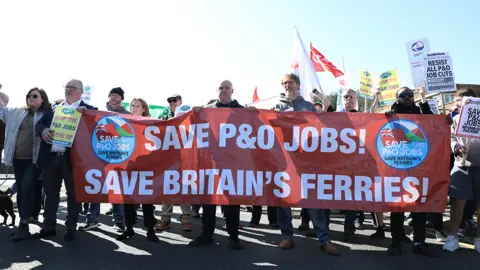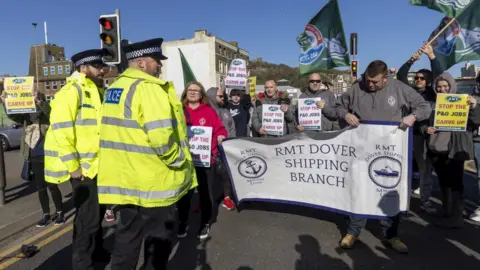Are the P&O Ferries sackings legal?
 Getty Images
Getty ImagesThe transport secretary has called for the boss of P&O to resign after the sacking of nearly 800 staff without notice.
Grant Shapps has called Peter Hebblethwaite's actions outrageous, and said that the government would force the company to U-turn.
However, Mr Shapps later told the Commons the government was "not in a position" to take court action against the company and any action would be down to trade unions and the workers themselves.
What did Peter Hebblethwaite admit to?
Mr Hebblethwaite admitted to a committee of MPs last week that he had not consulted his employees in advance, or their representatives, and admitted that this was against the law.
"There's absolutely no doubt that we were required to consult with the unions - we chose not to do that," he told MPs.
He said that the sacked employees would be compensated "in full", with a package worth £36.5m - 40 employees would get more than £100,000 and nobody would be paid less than £15,000.
What else has P&O been accused of?
Boris Johnson said last week during Prime Minister's Questions that the company had also broken the law by failing to give the government 45 days' notice of its actions.
However, lawyers suggested the prime minister was mistaken.
Changes to the law made in in 2018 stated that if the ship on which the employees were working was registered in another country, the management had to inform the authorities in the country where it was registered - not the country where it was operating.
P&O has ships registered in Cyprus, the Bahamas and Bermuda.
In a letter to the government, Mr Hebblethwaite said: "The very clear statutory obligation in this case was... to notify the competent authority of the state where the vessel is registered" and said that had been done on 17 March.
Mr Hebblethwaite re-stated this point in person to MPs on the House of Commons Transport Committee, although he did not explain how the company had complied with it.
Cypriot authorities need to be given at least 45 days' notice to make more than 100 redundancies. In Bermuda and the Bahamas, 30 days' notice is required.
Lawyers have also questioned whether P&O did in fact give the necessary notice to these authorities.
What rights do workers have?
Under UK law, employers planning to make 20 or more staff redundant within any 90-day period, must first consult staff and speak to trade union representatives.
If this doesn't happen, employees are entitled to take their employer to a tribunal.
Rosemary Connolly, an employment solicitor, says it appears P&O set aside the consultation phase and moved to terminate workers, as the process of consultation "ordinarily takes quite a lot of time".
"If consultation is going to be meaningful it needs to be a proper exchange," she says.
She believes that P&O staff who have been sacked, might be able to argue that their dismissal was unfair and make a claim.
Kate Palmer, HR advice director at Peninsula, agrees.
"There has been no meaningful consultation at all. It should be two-way process where the employees have the opportunity to put forward alternatives to that enforced termination and none of that has happened. So is it a fair process? No, based on that alone."
What problems might workers have in bringing a case?
Ms Connolly says a problem in such cases is that any action by the workers is "very much after the horse has bolted". Staff would have to wait months on average for an outcome.
She points out staff would have no jobs potentially during the claim period and would have to pay legal costs even if they win their case, although unions might help with those.
 Getty Images
Getty ImagesStaff are also being asked to sign forms that will prevent them taking legal action if they accept compensation from P&O.
However, the fact that P&O's owners, DP World, are based in Dubai, should not affect employees making a case for wrongful dismissal, according to Ms Connolly.
She says that under UK employment law, workers' rights are based on the "jurisdiction from which you work" - in other words, because they work in the UK, they are covered by UK law.
If this wasn't the case, she says, companies could just register themselves abroad and employment law could be ignored.
What is P&O's defence?
P&O says that the decision was taken "as a last resort and only after full consideration of all other options" because the company could not have survived otherwise.
Mr Hebblethwaite told MPs that the company needed to move to "a competitive operating model that is recognised throughout the world and our competitors also use".
Union representatives told the committee that Irish Ferries had also previously moved to hiring cheaper foreign staff, but that the unions still had good agreements with Stena and DFDS.
Transport Secretary Grant Shapps told BBC News that "Irish Ferries already went down this route" and warned that the company "will have to change their operating model".
